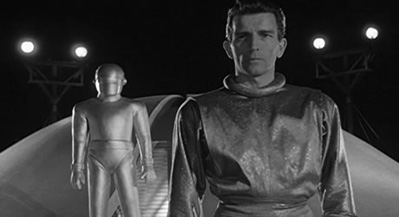Viking Night: The Day the Earth Stood Still
By Bruce Hall
July 14, 2015
BoxOfficeProphets.com

“Holy mackerel!”
Given the passage of time, and the fact that most sci-fi films today blow up at least one planet in the first 10 minutes, it’s an inauspicious start. It’s spoken by an astonished radar operator as he tracks an object of extraterrestrial origin streaking through the sky at 4,000 miles per hour. This movie came out in 1951, and to this day that’s twice as fast as any aircraft has ever flown. I know this was a time when openly referring to the “Hoover Dam” in a movie could lead to years of congressional hearings, but fish-related exclamations in response to the single most significant event in human history feels like an inadequate use of language.
But, it was a different time, as they say. And it was one where images of spinning newspapers or a montage of astonished radio announcers count as exposition. It's quaint, but hey, it still works. This is a film, you will find, that concerns humanity in general. And 10 minutes in, we've officially established a sense of multicultural emergency, or what passed for it in an age where half the country still tried to vote for Jefferson Davis every four years. So when the spacecraft safely lands on a baseball diamond across from the US Capitol (proving that even aliens know the game is boring, you can bet the military beat feet with everyone not already taking one for the team over in Korea.
Well, there's your headline for tomorrow, right? The first extraterrestrial being (but by no means the most alien) to set foot in Washington, D.C. is a middle-aged guy in aluminum foil pajamas who looks like Ward Cleaver's little brother and calls himself Klaatu (Michael Rennie). There aren't really any rules of engagement for an intergalactic wayfarer dropping anchor a mile from the White House. So, nobody's really sure how to greet Klaatu until some dipshit Private panics and busts a cap in him. Next thing you know, a giant indestructible robot lumbers out of the ship and starts melting things with his face until the wounded Klaatu commands him to stand down.
Holy mackerel.
Does it get more awkward? Some poor dude just flew halfway across the galaxy to say "hi" and accidentally gets hot lead for his trouble. Is there even a card for that? Luckily, the President quietly sends an emissary to say "sorry for shooting you," and Klaatu politely apologizes for the giant robot almost melting everything. That's good, because it turns out Klaatu has an important mission, and the fate of the world depends on it. But he can only discuss it with all the leaders of the world at once. That's not so good, on account of that whole "we just wrapped up WWII and are already hard at work on a sequel" thing.
In other words, all the countries in the world can't even agree on where to have the next war, let alone where to assemble an audience with an alien messenger of extraordinary power and intelligence. Speaking of intelligence, Klaatu grows impatient waiting, so he decides to walk amongst us and observe our ways to better understand us. This is at odds with his instructions to stay put, so worldwide panic ensues when he disappears. Klaatu observes this with detached amusement as he begins to meet people, hears their opinions on the crisis, and eventually gets to know a curious young boy and his compassionate mother (future Oscar winner Patricia Neal).
The thing I like best when watching a movie like this is to try and experience it through contemporary eyes. It was a very fractious world, with anti-Axis paranoia having been freshly replaced with anti-communist paranoia. The Soviets are never referred to by name, but they loom large. And the story's perspective on the fruitless nature of international conflict, against the background of the dawning Space Age is obvious. Like two squabbling children at the dinner table (a totally random comparison, I assure you), humans will seemingly fight over the color of the sky. How would that - hypothetically - fit into the context larger interstellar community?
Those are big ideas - probably too big for a society still worrying about the skin color of the guy sitting next to them on the bus. Robert Wise was probably a good choice to direct this story. His tendency to bring only the tools needed for the job results in a solemn, even handed and very fascinating allegory on tolerance and understanding. Rennie carries the film with the regal, vaguely bemused bearing of a vastly intelligent being asked to make first contact with a promising but backward society of bickering, racist morons. As apologue, it still carries resonance today, because of course, humans are still incredibly short sighted and stupid. But that's the beauty of great science fiction; it never loses its relevance.
The Day the Earth Stood Still is a timeless classic that wowed audiences at the time with its meticulously crafted (for the day) visual effects, meaningful storyline and pretty solid acting - at least out of the leads. Perhaps the only drawback to a movie like this is that thought provoking sci-fi tends to speak only to people who already get it. Everyone else is just going to hear a lot of “blah blah blah,” and have a hard time getting past the flying saucer and the guy in the rubber robot suit. That’s fine - people like that are what this movie is all about. It can be our little joke. And one day, when Klaatu Cleaver really shows up with his silver jumpsuit and giant Deathbot, we’ll know what to do. And the short-sighted among us can resort to panic, and screaming about fish.